The Okavango Delta without a vehicle
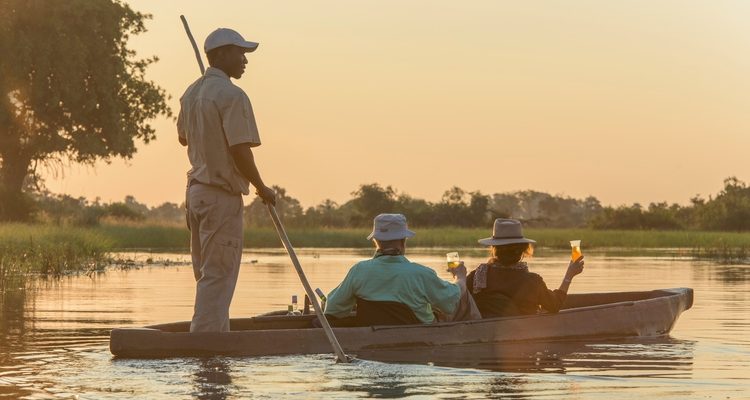
Botswana’s Okavango Delta is a magnet for superlatives, Africa’s last Eden, Paradise on Earth, all sorts of hyperbole is thrown at it. In truth, it is a truly epic place, one of pristine and delicate beauty, and intricate relationships between geography, wildlife, vegetation, water levels, migratory birds, and a mere handful of people. A glistening sparkling mosaic of floodplains, rivers, channels, islands, grassland and woodland, it supports an amazing amount of wildlife. There are myriad ways to enjoy this paradise alongside the more traditional wildlife drives in a 4×4. Here’s a selection of the best:
Walking
The private concessions in the Okavango Delta offer some lovely country for walking which is a fun way to see the small things often invisible from a vehicle. It’s also an excellent idea for keen bird watchers, as birds are less likely to be disturbed by footsteps than an engine.
Walks are generally for a few hours in the cool of the morning and taken as alternative to a drive. You might find that you’ll board a vehicle or a boat to reach a suitable start point and this only adds to the sense of adventure. For anyone keen to spend the majority of time walking, Footsteps Across the Delta and Pelo Camp are lovely, simple camps where walking, along with mokoro trips in traditional dugout canoes, is one of the core activities. Kwara, Splash, Gomoti Plains and Khwai Leadwood are among the other camps where walks can be arranged.
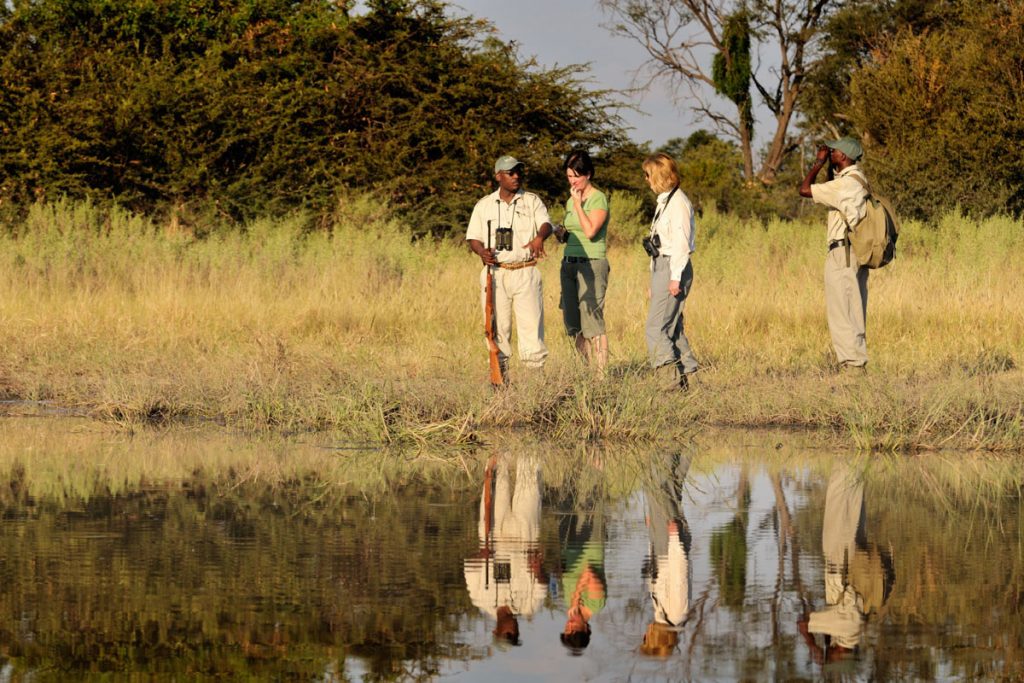
Exploring the bush on foot at Footsteps Across the Delta
Many other camps in private and community concessions offer walking safaris, and it’s a good idea to let us know in advance if you are keen, since the camp needs to make sure they have a qualified guide equipped with a rifle on hand for you. We do not recommend walking where guides are not allowed to carry a rifle.
Horse riding
Riding in Africa is a huge thrill. The combination of an elevated position, the prospect of terrific speed, and the connection between human and large quadruped is truly special, and being able to enjoy all of this in such stunningly beautiful surroundings must be one of the greatest privileges of all. Two fabulous operations in the southern part of the Delta, African Horseback Safaris (AHS) and Okavango Horse Safaris (OHS), have strings of seriously well-schooled safari horses. AHS generally ride out from their base, Macatoo Camp, each day. OHS has three camps and depending on how long guests are staying they can visit one or more of them.
As a rule, mornings start early, a quick cup of tea or coffee and perhaps a rusk or a piece of toast, followed by a three to four hour ride. This might include a long canter across an open floodplain, picking your way carefully through patches of forest, or wading through deep waterways with wet boots and jodhpurs. In addition to the thrill of riding, viewing wildlife from a powerful living being is exhilarating; enjoy the proximity of elephant, giraffe, buffalo, zebra, and even the smaller predators such as hyena and wild dog. Breakfast is either back at camp or in a suitable location out in the bush.
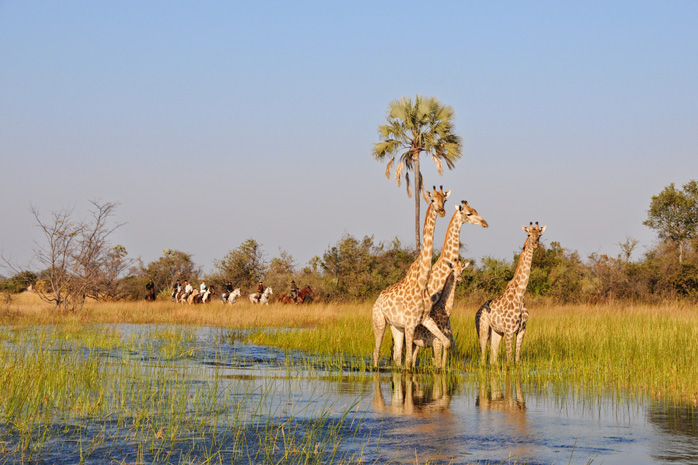
Fabulous riding safaris in the Okavango Delta with African Horseback Safaris
Lunch is a relaxed affair, usually in camp, although possibly taken as a picnic with OHS if moving between camps. After a siesta, the day ends with a shorter and slightly slower ride, enjoying the late afternoon light and the excellent wildlife and bird viewing that’s on offer at this gorgeous time of day. Sundowners are usually in camp, so that the horses are safely back in their barn before dark and being fed and watered after a day’s work. There is often an opportunity to swim with the horses, generally once the sun is well up and providing plenty of warmth to horses and riders. Swimming with a horse is exhilarating and great fun, and it’s surprising how much the horses enjoy it too.
Mokoro – traditional dug-out canoes
Silent, elegantly slow, up close and personal with the water, eye level with frogs, lizards, birds and aquatic plants, a cruise in a mokoro is a fabulous way to spend a morning or afternoon in this beautiful wilderness. You might not see so much wildlife, but you can hear everything from the rippling sound of the water along the hull to the cry of the fish eagle, and all the bird, insect and animal noises inbetween. It’s fabulous, and the combination of feeling so small but intimately immersed in Africa is inspiring.
These dug-out canoes were traditionally made from hollowed out sausage tree trunks, but are usually made of fibreglass nowadays to avoid cutting down mature trees. Mokoros have long been the favoured form of transport for the people in the Delta and serve their purpose very well, being relatively easy to make, durable and with a surprising load capacity.
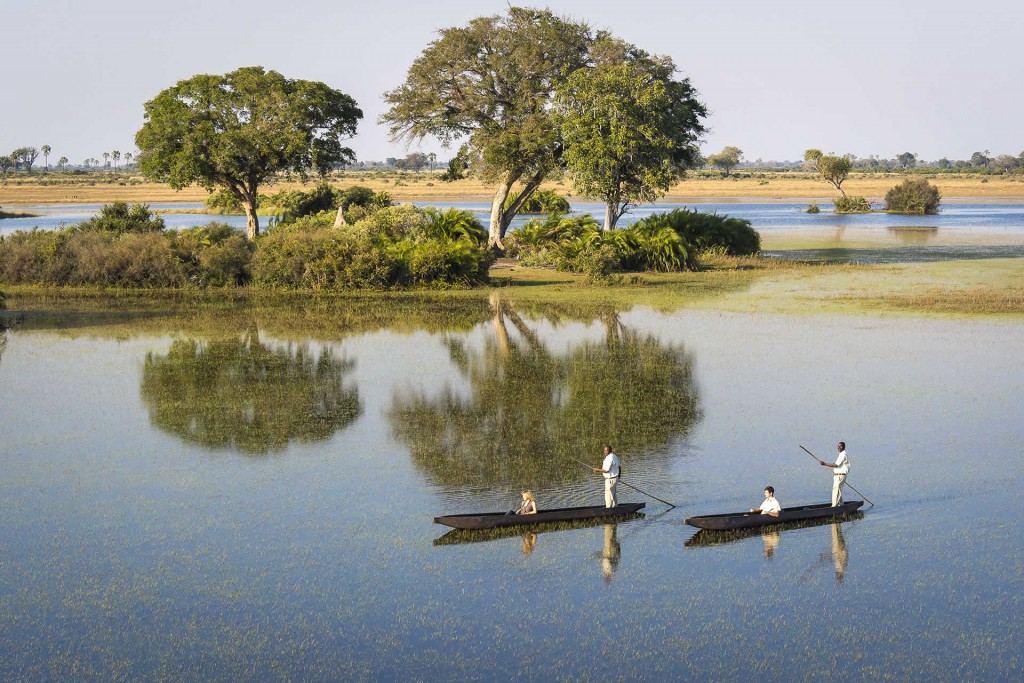
Gliding through classic Delta scenery on a mokoro canoe from Jao Camp
Propelling one of these delicate craft looks as simple as falling off a log, but it’s actually a job for an expert! One of the funniest things I’ve seen in Africa was a mokoro filling with water from the back as a guest tried to show his wife how clever he was… sadly she was sitting amidships at the time, and the water came up to shoulder height….. Camps with good water for mokoros include Setari, Kanana, Splash, Jao, Khwai Leadwood, Gomoti Plains, Kwara, and Qorokwe.
Boats
There are plenty of permanent waterways in the Okavango Delta, including way upstream in the Panhandle, where motor boats are perfectly at home and offer a stable and comfortable platform for viewing wildlife and birdlife, as well as the magnificent flora of this unique habitat. The boats can get around the channels quite swiftly, and reach places that have plenty of wildlife to see. Penetrating dense stands of papyrus in a boat is a really good way to learn more about life in these inaccessible swamp habitats, and have a chance to see antelope species such as sitatunga.
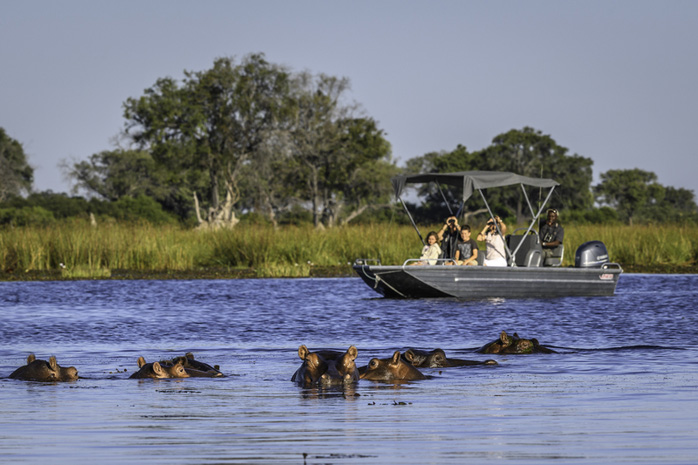
Cruising through the Delta from Little Vumbura
Double decker boats are used in several places and provide a good vantage point for bird watching, especially at a number of large heronries. Skilled drivers cruise in slowly and cut the motor before the boat gets too close, and this gives guests a great view of these amazing breeding colonies. Camps that we really like that have year round boating include Setari, Little Vumbura, Kwara, and Kanana.
Hides
Some camps have photographic hides where guests can spend an hour or two waiting quietly for the wildlife to come to them. Several even have a fridge and loo installed to allow for long stints behind the lens. With the wildlife oblivious to human presence it is able to concentrate on what it feels is important, such as having a drink or finding something to eat. The resulting photographs can be quite stunning.
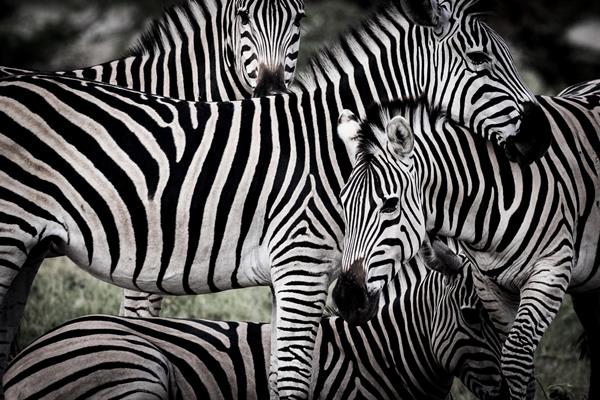
Wonderful photographic opportunites from the hide at Mombo Camp
One example is the hide at Hyena Pan where a shipping container has been buried beside a waterhole to give a water’s-eye-level view of elephant’s feet and trunk tips. It’s in a part of the Delta with a lot of mopane trees and scrub, which elephant, kudu and other browsers love when it comes into leaf. The Jackal & Hide is a small camp which has, as its name suggests, a ground level hide, so that guests may enjoy sitting in peace to see what comes along. Other camps in excellent wildlife areas which have hides include Qorokwe and Mombo.
Sleepouts and star gazing
Africa’s night skies are among the clearest on Earth – the sheer quantity of stars lighting them has to be seen to be believed. With generally cloudless skies and no light pollution, the Okavango Delta is a fabulous place for star gazing and for sleeping out under the twinkling heavens. Plenty of guides have excellent knowledge of the night skies, and some also know the ancient stories and mythology of the people of the Kalahari relating to some of the stars.
Spending a night under the stars is wonderfully romantic and adventurous. With just a mosquito net to separate you from the wild, the unfiltered nocturnal noises of the bush wash over your ears; the mournful whoop of a hyena, the chirp of a scops owl, the churring and warbling calls of nightjars, the croaking of frogs, the distant roar of a lion, and rumbles from elephants are all a sort of natural lullaby. This is not to say that it’s a risky proposition, as sleep outs are most often on decks raised off the ground or built high up in a tree. There will also be a guide nearby, easily summoned by radio in case of need.
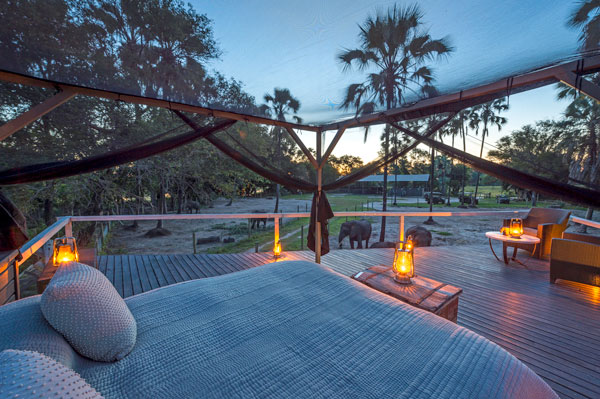
Sleeping above the elephant boma at Abu Camp
Among our favoured camps with sleep out decks are Kanana, Skybeds, African Horseback Safaris, and Tubu Tree. Okavango Horse Safaris has a lovely simple fly camp which does the same but for more than two guests at a time. Abu Camp takes it to another level with a sleep out deck beside the elephant boma, so guests can genuinely claim to have slept among the elephants.
Eat-outs and Sundowners
Plenty of safari camps will arrange spontaneous meals in the bush, where you round a corner to find a sumptuous breakfast or lunch laid out for you at the end of a wildlife drive or bush walk. Some will go further, especially mobile safaris, and African Horseback Safaris also arrange dinner under the stars.
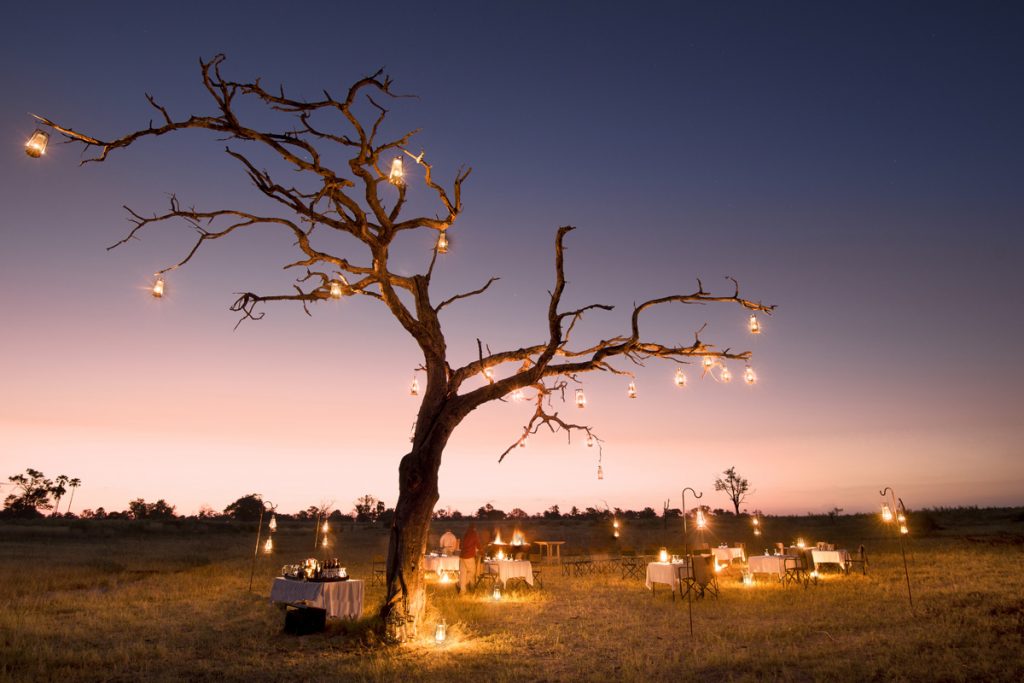
Dining under the stars at Nxabega Okavango Tented Camp
Sundowners are an African safari tradition and a wonderful way to make the best of each day. Guides find a beautiful, peaceful place, often overlooking water or a wildlife-filled floodplain, and out comes the bar. Whether you like a beer, a bloody Mary, a glass of crisp white wine, or a whisky, there’s no better finish to a day in the bush than toasting the setting sun with your favourite drink and some tasty nibbles. On private concessions, sundowners often morph into a spot-lit drive back to the camp for dinner, which is a wonderful addition to a day on safari.
Fishing
With so much water about, fish populations are plentiful and varied. Catch and release fishing is permitted year round except during the breeding months of January and February, and catfish,tilapia or bream are the most often caught fish in the Delta itself. Tigerfish can be caught in the Panhandle where there is more water and a stronger current, but they do not favour the smaller channels of the Delta itself.
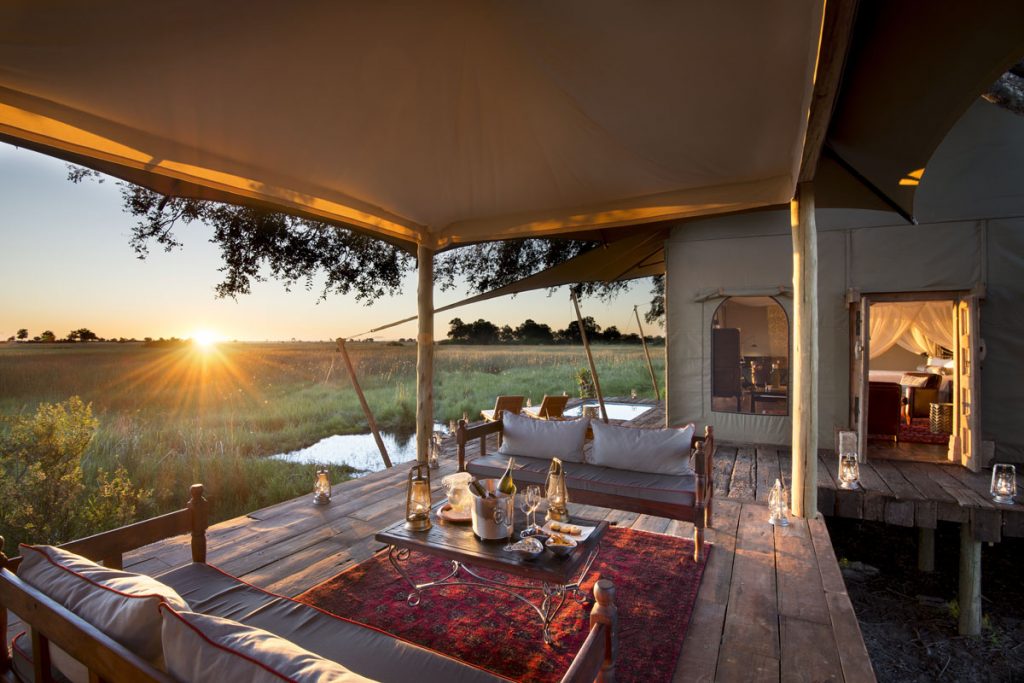
Spectacular Duba Plains camp where fishing is one of the activities on offer
Many of the camps located close to water in the Delta offer fishing, and it’s a lovely way to spend an afternoon. You’ll generally go out in a boat to a spot which is known to have good fish stocks, and enjoy the peace and quiet, bird calls, and perhaps some wildlife coming to the water’s edge. While it’s worth noting that it depends on water levels which vary throughout the year, Pelo, Kwetsani, Duba Plains, Kwara, Pom Pom, Kanana, and Nxabega are good examples of camps with fishing opportunities.
Elephant interaction
For many people, elephants are the pinnacle of Africa’s large wildlife. Giant, charismatic, intelligent, social, immensely powerful yet astonishingly dextrous and gentle, and endlessly fascinating to watch. With their ability to change ecosystems and create waterways and pools, they are also vital for the health and productivity of many of Africa’s most important wilderness regions. Since they traditionally covered such vast distances during their migrations across the continent, conflict with humans has long been part of an elephant’s expectation, and they are naturally wary of us.
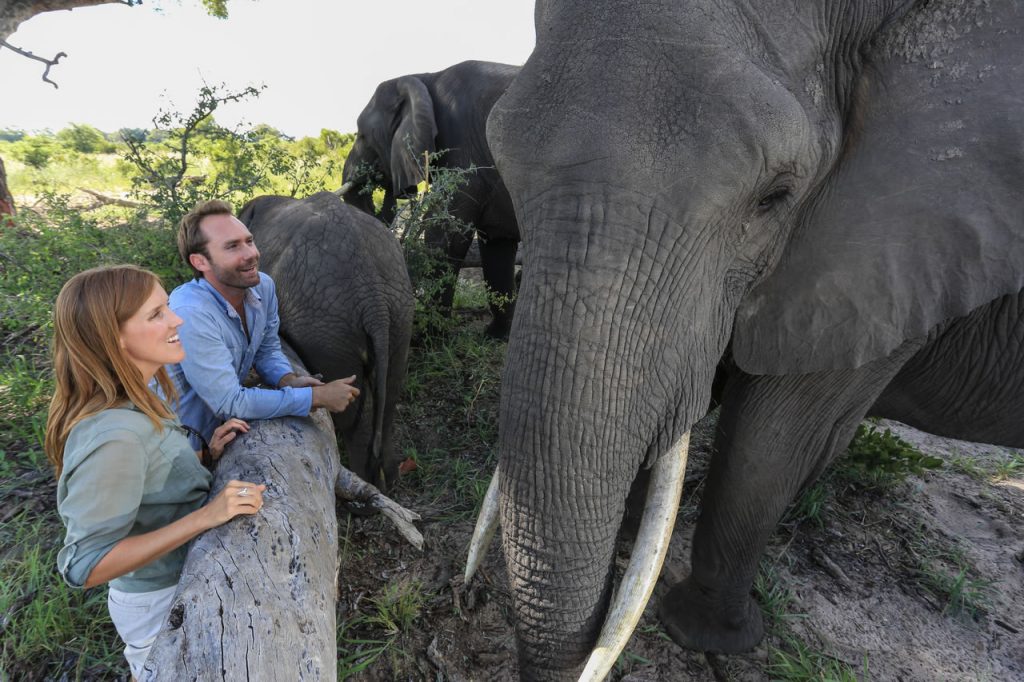
Extraordinary elephant interaction at Abu Camp
There are opportunities to get up close and personal with elephants, including the sunken hide at Hyena Pan and, possibly the best of all, at Abu Camp. Abu is home to a number of rescued elephants, often quite young, which have been given a safe life in the bush where they can learn the ways of the wild along with human and elephant family members. Guests are able to walk with the elephant as they head out to feed, drink, swim, play and just be natural elephants. They return to a safe enclosure each evening, so they cannot be attacked by lion or wild elephant, and it’s here that guests can enjoy the extraordinary experience of sleeping above them on a specially raised platform.
Bush Skills Course
If you’re keen to immerse yourself in the bush and to learn more about the deeper, more intricate and fascinating facets of nature and also to learn how to survive, thrive and enjoy it without needing a vehicle, perhaps consider a Bush Skills Course with the African Guide Academy. It is based at Kwapa Camp in the Okavango Delta, and offers a seven night course that teaches students how to read the signs of the bush, track wildlife, handle a weapon, conduct a walking safari, and identify mammals, birds, trees, reptiles and insects. In addition to this, participants can learn about astronomy, navigation, 4×4 driving, and sleeping out. Expert trainers will also deliver lectures about the geography, hydrology, geology and climate of the Okavango Delta. If you’re prepared for a challenge, this could be it!
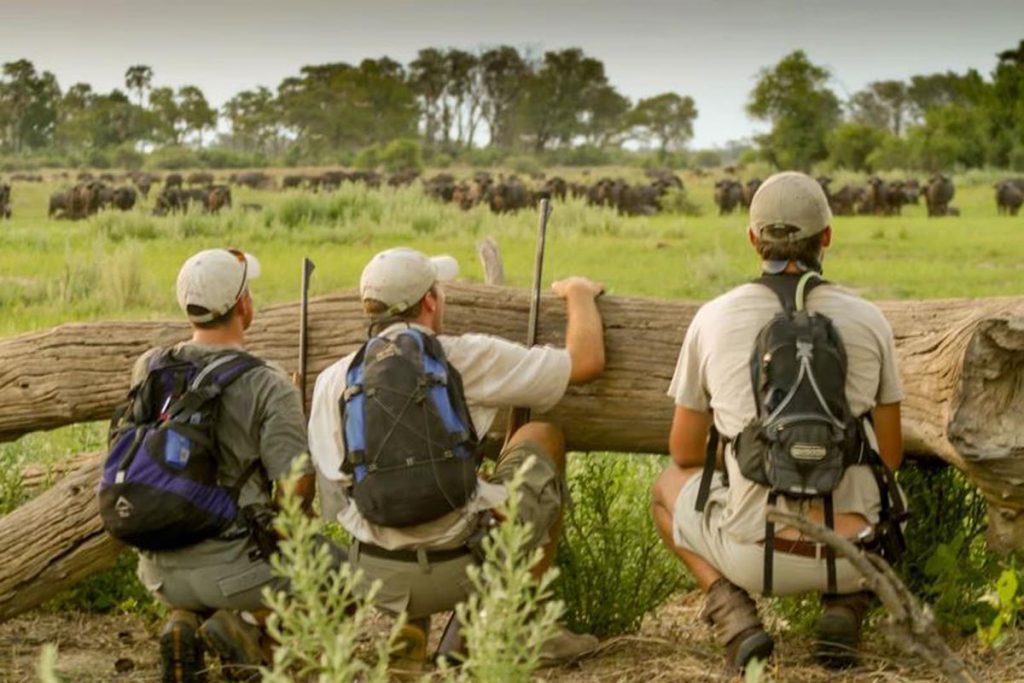
Learning bush skills at the African Guide Academy
Balloon flights
Taking a balloon flight above the Okavango Delta is wondrous experience, floating silently above the treetops with a bird’s eye view of the mosaic of waterways, floodplains, woodland, and grasslands below. It’s a fabulous way to see the world waking up as the sun’s rays warm the land, and to see wildlife and birds as they look for food.
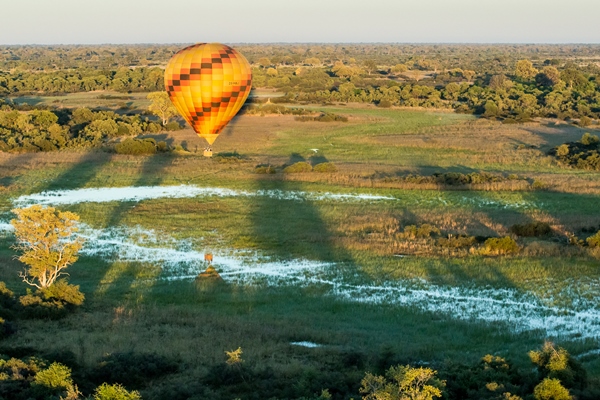
Drifting above the Okavango Delta on a balloon flight from Vumbura Plains
The balloon holds just eight passengers, so this is a relatively personal experience. Taking off at around sunrise, you’ll enjoy some of the most beautiful light of the day, as well as a fantastic breakfast in the bush when you land after an hour aloft. Ballooning is an option from Little Vumbura, Setari, Vumbura Plains, and Mapula Lodge, all in the wildlife-rich northern part of the Delta.
Helicopter flights
Helicopter flights are an exhilarating way to see the Delta from above, and to get a better understanding of the complexity of this fabulous landscape with its maze of channels, plethora of islands, and varied vegetation. Very stable while flying, helicopters are also excellent photographic platforms.
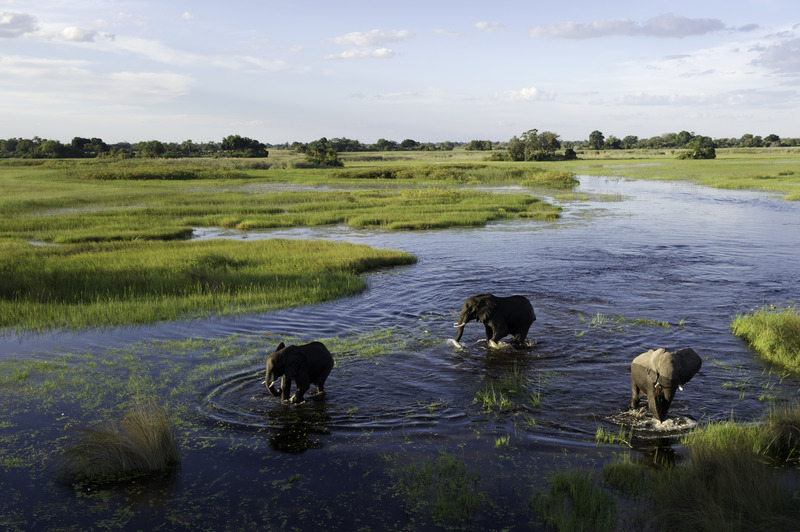
Helicopter flights provide superb wildlife viewing. Elephant close to Jacana Camp
Flights can be 30 minutes to an hour or more, depending on guests’ wishes, and the amount of distance they’d like to cover. They can be arranged in advance from most safari camps in the Okavango Delta.
Specialist guides
If, like me, you adore trees, please let us know. There are guides in the Okavango Delta who know every species, the wildlife, insects and birdlife associated with each one, and their traditional uses in local culture. Similarly, bird enthusiasts will find the Okavango Delta to be a paradise, especially during the green months, November to April, when many migrant species arrive and resident species are also sporting their flamboyant breeding plumage.
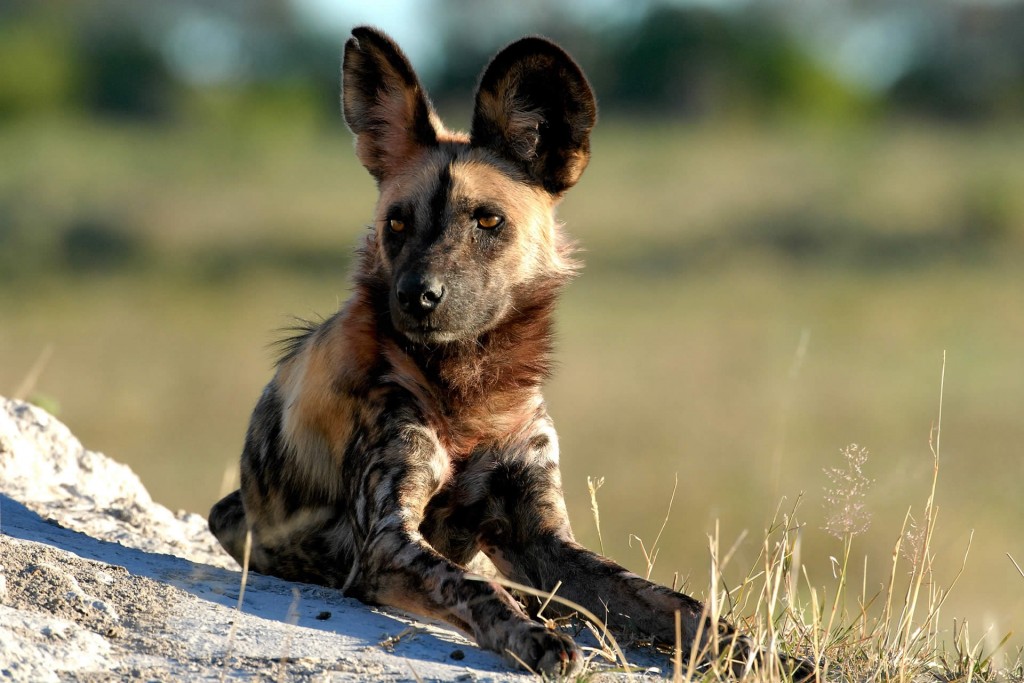
It’s possible to arrange specialist guides at some camps if you have a particular animal interest. Wild dog close to Kwara Camp
We can arrange specialist birding guides to make sure you get the very best from your safari. If you have an especially favourite animal species please also let us know. With sufficient notice, Kwara and Splash camps can sometimes arrange for researchers to visit and give a talk about the specific animal or bird of interest.
Spa treatments
Africa is incredibly good for the soul and body thanks to its wilderness and wildlife, and the way in which it allows people to reconnect with nature and reality. Even so, for many people a luxurious spa treatment or massage to relax body and mind is a real treat, and a number of beautiful lodges in fabulously pristine settings in the Delta have spas, including Mombo, Abu, Chief’s Camp, and the newly rebuilt Jao and Xigera Camps. Relaxing with the soothing luxury of a massage here is a fantastic addition to a safari holiday.
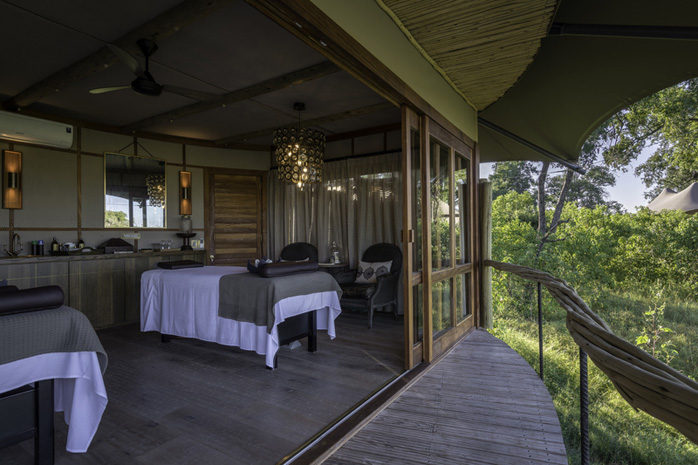
Spa at Mombo Camp
What Next?
Let us know if you would like itinerary ideas to explore the Okavango Delta without a vehicle and we’ll put something together for you. Give us a call, or drop us an email and we’ll respond as quickly as we can – usually on the same day. We very much look forward to talking to you.
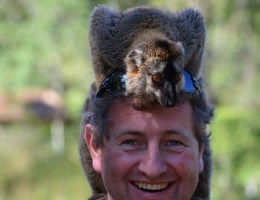
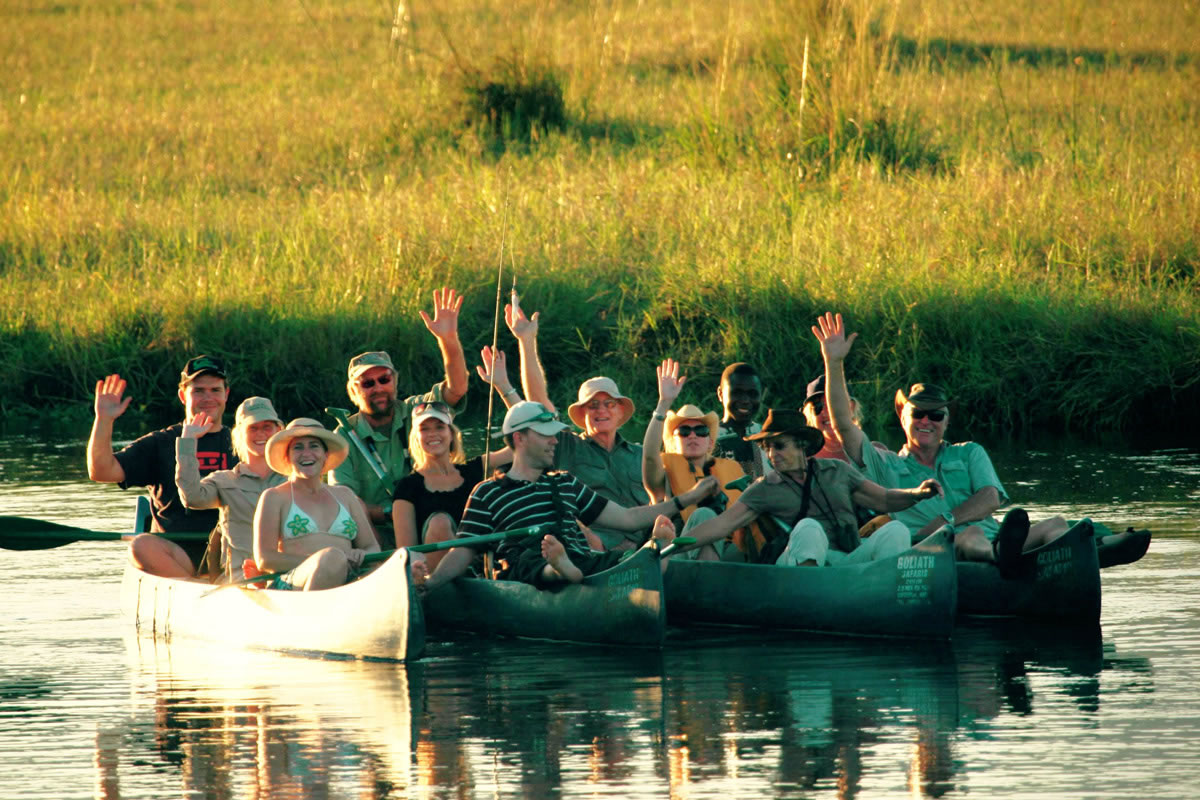
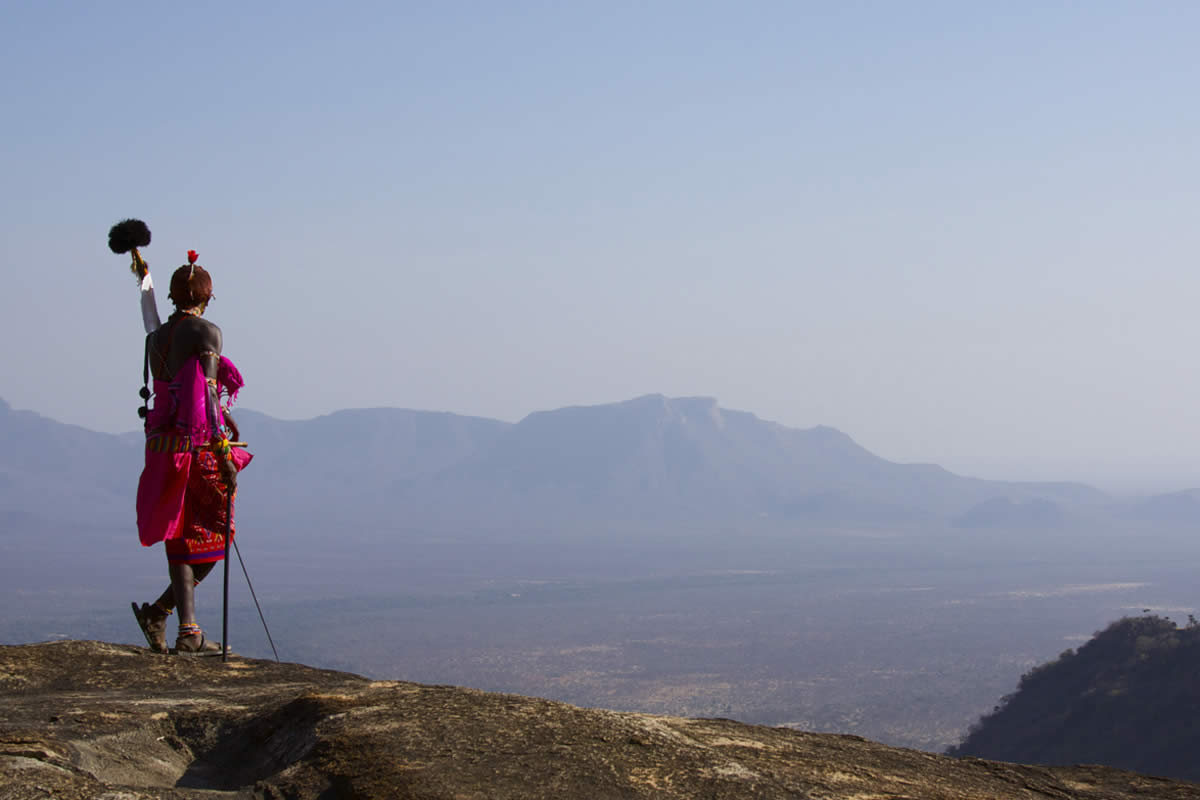
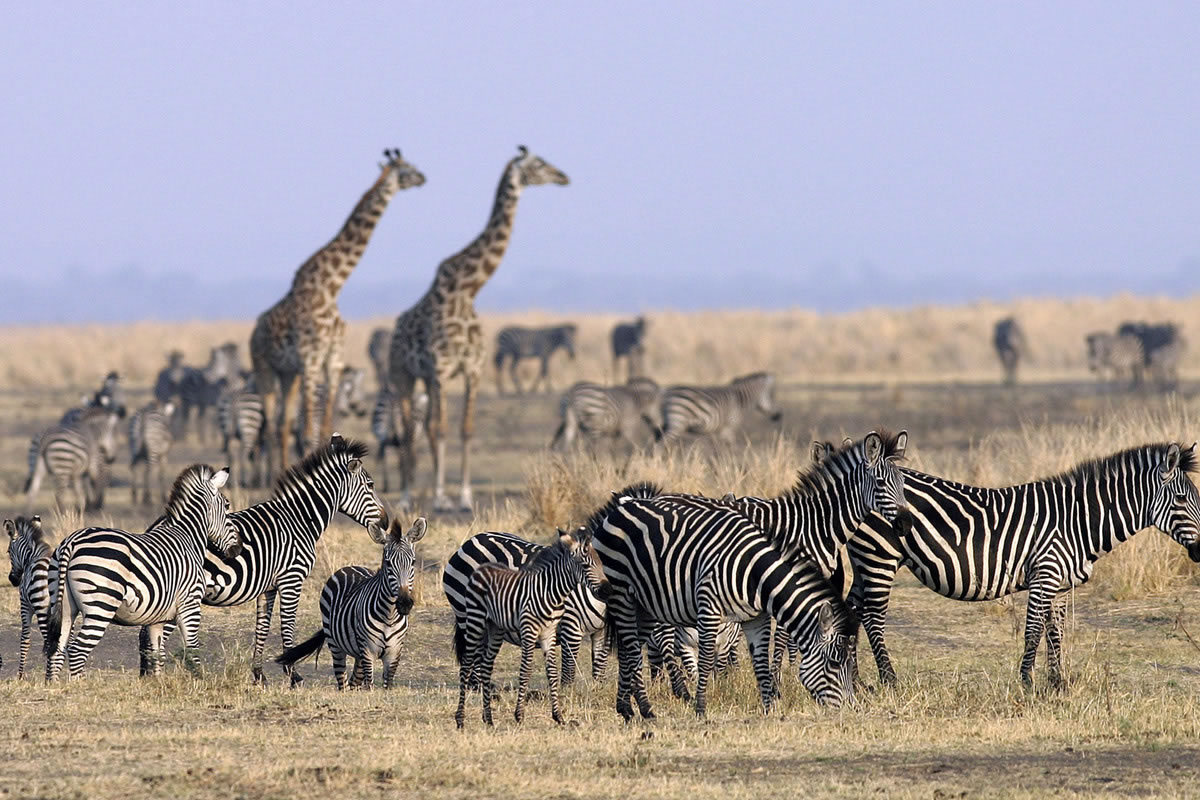

Leave a Reply